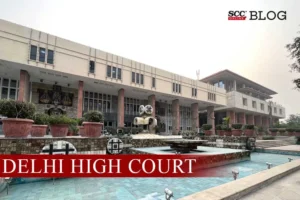Delhi High Court: A petition was filed by the petitioner challenging his extradition by Union of India to the Sultanate of Oman which is the requesting State. Amit Bansal, J., upheld the decision of the Union of India to extradite the petitioner to the Sultanate of Oman
The petitioner being a permanent resident of Uttar Pradesh, India was working as a labourer in Bidiyah, the Sultanate of Oman. On 31-07-2019, Bidiyah Police Station received a report that one Omani national along with his wife and three minor children was found dead at his home. On preliminary investigation, the authorities in Oman found fingerprints and DNA samples of the petitioner along with that of the other Fugitive Criminals (FCs). As per the preliminary investigation, the four FCs were found to have committed offences of premeditated murder felony punishable under Article 302-A of Penal Code of Oman. Subsequently, all the FCs absconded from Oman to India.
A request for provisional arrest of all the FCs was made on behalf of the Requesting State in terms of Article 11 of the Extradition Treaty between the Republic of India and the Sultanate of Oman (Extradition Treaty). Pursuant to the same, an application under Section 34-B of the Extradition Act, 1962 (Extradition Act) was moved by the Respondent for issuing provisional arrest warrants against the FCs wherein arrest warrants were issued against the FCs through CBI Interpol and the petitioner was arrested. A formal request was sent by the Requesting State for extradition of all the four FCs, pursuant to which, the Ministry of External Affairs, Union of India requested under Section 5 of Extradition Act for an inquiry to be conducted by Additional Chief Metropolitan Magistrate (ACMM-01), New Delhi District, Patiala House Courts, New Delhi. Since the remaining FCs could not be apprehended, the inquiry proceeded against the present petitioner pursuant to which the impugned order was passed.
The Court noted that perusal of the provisions of the Extradition Act would show that extradition in respect of a Treaty State must be in relation to an offence provided for in the Extradition Treaty with that State. India has an Extradition Treaty with the Sultanate of Oman which has been duly notified by the Ministry of External Affairs, Union of India vide Gazette Notification dated 01-06-2006. Article 2 of Extradition Treaty states that “persons accused of an offence punishable under the laws of both Contracting States by imprisonment for not less than one year or for more severe punishment” shall be extradited. The standard of proof in an inquiry in an extradition case is not of the same level as that required in a trial. This is because the scope of the inquiry is only to come to a prima facie conclusion and not to establish the actual guilt of the FCs.
The Court further noted that there is nothing to suggest that the offence for which the petitioner is charged, i.e. murder, is a political offence. The offence of murder is punishable in both India and Oman with a punishment of more than one year imprisonment and is therefore an extraditable offence as per the Extradition Treaty. Section 10 of the Extradition Act does not envisage that authorities from the Requesting State should depose before the Indian Courts and only then the documents/exhibits submitted by the Requesting State can be admitted in evidence. The mandate of Section 10 of the Extradition Act is absolutely clear that all exhibits and depositions that are authenticated by the Requesting State can be received in evidence. Thus, all the documents have been signed by the Attorney General of the Requesting State and duly authenticated by the office of the Public Prosecution of the Requesting State.
The Court observed that the Requesting State has assured the Government of India that the petitioner will have a fair and just trial and he would be provided with a lawyer to defend himself and an interpreter would also be provided to him during the investigation as well as the trial. The Court concluded that the application is devoid of merits and just an attempt on part of the petitioner to delay his extradition, as the petitioner has not given any details of the documents or the evidence that the petitioner seeks to rely upon in his defence.
[Majibullah Mohammed Haneef v Union of India, 2023 SCC OnLine Del 7334, decided on 24-11-2023]
Advocates who appeared in this case :
Mr. Bahar U. Barqui and Mr. Maroof Ahmad, Advocates for petitioner
Mr. Chetan Sharma, ASG, Mr. Ajay Digpaul, CGSC, Mr. Amit Gupta, Ms. Swati Kwatra, Ms. Ishita Pathak, Mr. Kamal Digpaul and Mr. Saurabh Tripathi, Advocates for respondents

